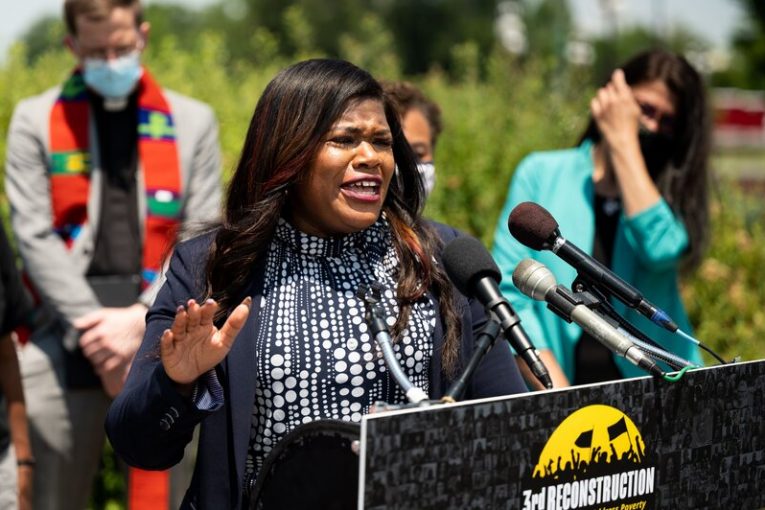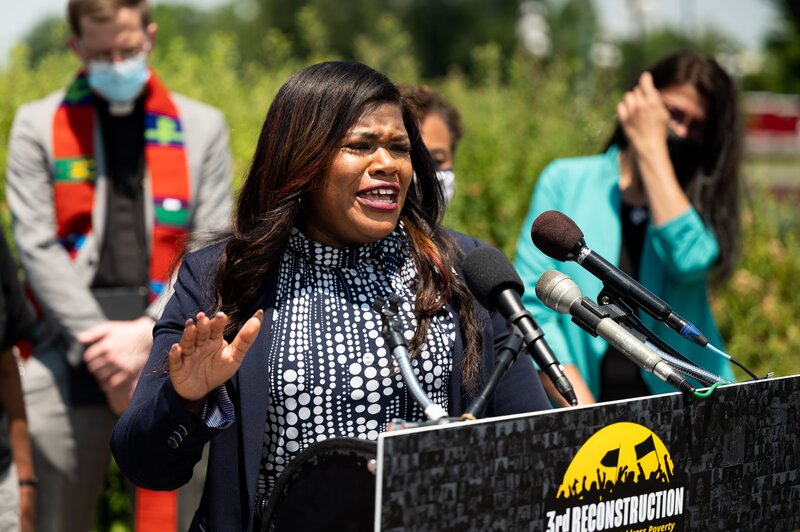

By Ankita Joshi and Fiona Davis
WASHINGTON DC – Congresswomen Cori Bush, Ayanna Pressley, Jan Schakowsky, and Pramila Jayapal this week introduced The People’s Response Act—a piece of legislation that looks to create a public safety division within the Department of Human Health and Services, citing a need to change the country’s current approach to public health.
The People’s Response Act, with the creation of a new public safety division, would specifically look to both fund and facilitate “research, technical assistance, and grant programs” that invest in public safety that centers on health rather than incarceration.
“The People’s Response Act will transform public safety into a system of care rather than criminalization, healing rather than incarceration, and prevention rather than policing,” said Congresswoman Bush in her introduction and endorsement of the bill.
“We are safer when our communities are well funded, our people are healthy and housed, and our children have nutritious meals, excellent schools, and green spaces to play in,” she added.
The People’s Response Act would also aim to create a federal first responders unit, to research new methods that would address public safety in coordination with federal agencies, and to  establish several billion dollar grants.
establish several billion dollar grants.
These grants would in part fund public safety, create thousands of jobs, and “provide funding to state, local, and tribal government” … “in an effort to improve crisis response and increase non-carceral, health-based approaches to public safety.”
This includes providing $7.5 billion in grant funding to state and local governments and community organizations, as well as establish a $2.5 billion First Responder Hiring Grant to create thousands of jobs and provide funding to state, local, and tribal governments and community organizations.
Maritza Perez, Director of the Office of National Affairs for Drug Policy Alliance, stated that her office was “proud” to enforce The People’s Response Act.
“When people’s needs are met, this is when we have flourishing, healthy communities,” … “This bill seeks to create public safety by ensuring individuals and communities have the infrastructure they need to thrive,” she said.
Many state officials and organizations have spoken in support of the People’s Response Act, and the positive change it would instill in the nation.
Congresswomen Pressley and Schakowsky both applauded the Act for “directing the federal government to take a health-centered approach to public safety and investing in trauma-informed, community-based responses that will truly keep people safe.”
Inspired by the protests that spread through the nation last year, Congresswoman Bush noted in her statement that the “demand that we transform our system of public safety to build a future where Black, brown, Indigenous, and marginalized communities can live full and joyous lives” must be addressed.
Kayla Reed, Executive Director of Action St. Louis and leader of the Movement for Black Lives’ Electoral Justice Project, also highlighted how the Act “moves us toward a shared vision of what truly keeps Black people safe: dramatic investments in communities that have suffered from generations of systemic racism and economic exploitation, incentives for local governments to adopt critical non-carceral practices, and the creation of a federal community safety agency.”
Other organizations have also drawn attention to the change the Act would have on police violence and the use of alternative methods of treatment.
“Our nation is overdue for structural change to transform our law enforcement system and investment in community-led, health-based approaches to public safety,” stated Alphonso David, Human Rights Campaign President.
“The creation of this new federal division would allow us to develop better evidence-based solutions to crime and work to resolve the longstanding social and financial costs of jail and prison overcrowding,” said Lt. Diane Goldstein (Ret.), Executive Director of the Law Enforcement Action Partnership.
“Far too many people with psychiatric disabilities, and particularly those who are people of color, have died or experienced needless incarceration due to avoidable contacts with law enforcement,” said Jennifer Mathis, Director of Policy and Legal Advocacy for the Bazelon Center for Mental Health Law.
And while these were just a few of the state officials and organizations that have shown their support, The People’s Response Act has been co-sponsored by 20 members and endorsed by more than 70 organizations.
“Public safety is a public health issue. It’s time our approach reflects that,” said Congresswoman Bush. “The House of Representatives is the People’s House and we need the people’s response to this moment. We need The People’s Response Act.”






